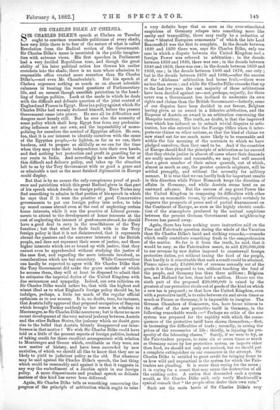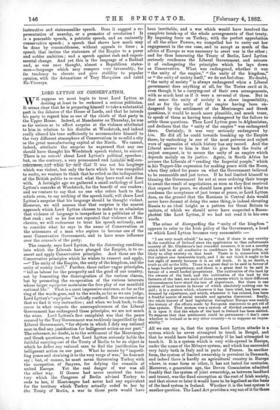SER. CITART:FIS DTTNE AT CHELSEA.
SIR CHARLES DILKE'S speech at Chelsea on Tuesday ought to convince reasonable politicians of every shade, how very little there is to fear of the nature of what is called Revolution from the Radical section of the Government. Sir Charles Dilire's name is associated in the public imagina- tion with extreme views. His first speeches in Parliament had a very decided Republican tone, and though the great ability of his later political action has thrown his earlier crotchets into the shade, there is no man whose admission to responsible office created more sensation than Sir Charles Dilke's,—not even Mr. Chamberlain's. But his speech at Chelsea expresses nothing so much as an almost scientific calmness in. treating the vexed questions of Parliamentary life, and an earnest though unselfish patriotism in the hand- ling of foreign politics. Look at the mode in which he deals with the difficult and delicate question of the joint control of England and France in Egypt. Here is a policy against which Sir Charles Dilke had warmly declared himself, before the present Government came into power. He sees all its difficulties and dangers most keenly still. But he sees also the necessity of some policy which shall keep Egypt free from any predomin- ating influence not our own, and the impossibility of mono- polising for ourselves the control of Egyptian affairs. He sees, too, that it is our interest to identify ourselves with the cause of the Egyptian people,—to lighten, so far as we can, their burdens, and to prepare as skilfully as we can for the time when they may take their independence into their own hands, and find nothing but protection and profit in guarding for us our route to India. And accordingly he makes the best of this difficult and delicate policy, and takes up the situation left to us by the Tory Government 'with- as good a grace and as admirable a tact as the most finished diplomatist in Europe could display.
But that is by no means the only conspicuous proof of prud- ence and patriotism which this great Radical gives in that part of his speech which dwells on foreign policy. Even Tories may find something to admire in that portion of his speech in which he says that if it were the practice of good Conservative governments to put our foreign policy into order, to take up sound causes abroad even at the cost of neglecting certain home interests, while it was the practice of Liberal govern- ments to attend to the development of home interests at the cost of neglecting the interest of good causes abroad, he should have a good deal to envy in the unselfishness of the Tory function ; but that what he finds fault with in the Tory foreign policy is that it is not disinterested, that it represents abroad the passions and the narrower interests of the British people, and does not represent their sense of justice, and those higher interests which are so bound up with justice, that they cannot even be apprehended without studying the justice of the case first, and regarding the mere interests involved, as considerations which are but secondary. While Conservatives can hardly be expected to agree with Sir Charles Dilke that the Tory Government did make the grave mistake of which he accuses them, they will at least be disposed to admit that he estimates the imperial duties of the United Kingdom with due seriousness and sympathy. Indeed, our own criticism on Sir Charles Dilke would rather be, that with the highest and wisest iaeal as to what England's foreign policy should be, he indulges, perhaps, a little too much of the regular official optimism as to our success. It is, no doubt, true, for instance, that Austria fully approved that proposed occupation of Smyrna which brought Turkey suddenly to her senses in relation to Montenegro, as Sir Charles Dilke assures us; but is there no more recent development of thevery natural jealousy between Austria and the other Balkan States, the jealousy which no doubt gave rise to the belief that Austria bitterly disapproved our inter-
ference in that matter ? We wish Sir Charles Dilke could have told us a little of the present aspects of foreign politics, instead of taking credit for those excellent arrangements with relation to Montenegro and Greece which, creditable as they were, are now matter of history, and have been succeeded by new anxieties, of which we should all like to know that they are as likely to yield to judicious policy as the old. But whatever may be said against Sir Charles Mike's speech, the last thing which could be reasonably said against it is that it suggests in any way the embodiment of a Jacobin spirit in our foreign policy. A more dispassionate and prudent speech on delicate matters of this kind has never been delivered.
Again, Sir Charles Dilke tells us something concerning the progress of the principle of arbitration which ought to raise a very definite hope that so soon as the over-stimulated suspicions of Germany relapse into something more like sanity and tranquillity, there may really be a reduction of those "bloated European armaments" of which the late Lord Beaconsfield was the first to complain. In the decade between 1820 and 1830 there was, says Sir Charles Dile, only one case in which a dispute between the United Kingdom and a foreign Power was referred to arbitration ; in the decade between 1830 and 1840, there was one ; in the decade between 1840 and 1850, there was one ; in the decade between 1850 and 1860, one ; in the decade between 1860 and 1870, one only ; but in the decade between 1870 and 1880,—after the success of the ' Alabama ' arbitration had borne fruit,—there were no less than seven ; and while Sir Charles Dilke remarks that up to the last few years the vast majority of these arbitrations have been decided against us—not, perhaps, unjustly, for there never was a Government less inclined to underrate its own rights and claims than the British Government—latterly, some of our disputes have been decided in our favour, Belgium having given us an award in a fisheries arbitration, and the Emperor of Austria an award in an arbitration concerning the Mosquito territory. The truth, no doubt, is that the improved tone which has induced us to submit trivial disputes to arbi- tration, has also entered into the Foreign Office when it inter- prets our claims on other nations, so that the kind of claims we now stand out for are much more likely to be reasonable and within the fair meaning of the contracts to which we have pledged ourselves, than they used to be. And if the countries of Europe should find the principle of arbitration so far succeed that they obtain justice in almost all cases where their demands are really moderate and reasonable, we may feel well assured that a great number of their minor quarrels, out of which, almost as much as any, the greater quarrels originate, will be settled promptly, and without the necessity for military menace. It is true that we can hardly look for important results in this direction while Prince Bismarck keeps the direction of affairs in Germany, and while Austria seems bent on an eastward advance. But the success of any great Power like the United Kingdom in composing its difficulties with other nations on reasonable terms, by arbitration, ought certainly to improve the prospects of peace and of partial disarmament on the Continent of Europe, so soon as the highly electric condi- tion of the atmosphere produced by the mutual suspicions between the present German Government and neighbouring Powers has passed away.
Again, there has been nothing more instructive said on the Free and Fair-trade question during the whole of the Vacation than Sir Charles Mike's lucid and striking remarks,—remarks which really contribute something fresh to the comprehension of the matter. So far is it from the truth, he said, that it would be easy, as the Fair-traders assert, to add £20,000,000- to our revenue by new duties imposed to countervail foreign protective duties, yet without taxing the food of the people, that hardly is it conceivable that such a result could be attained. France raises only £3,000,000 of revenue annually out of the goods it is thus proposed to tax, without touching the food of the people, and Germany less than three millions ; Belgium less, and Holland far less, than half a million. Hence not the sixth part of the proposed £20000,000 is raised by the greatest of our protective rivals out of goods of the kind on which a new tax is proposed ; so that how the United Kingdom, even with a protective tariff, is to raise between six and seven times as much as France or Germany, it is impossible to imagine. The German Chambers of Commerce, too, have borne witness to the effect of the new protective tariff in Germany, in the following remarkable words :—" Perhaps no critic of the new
system was prepared for the rapidity with which the conse- quences of the protective tariff have shown themselves,—first, in increasing the difficulties of trade ; secondly, in raising the prices of the necessaries of life ; thirdly, in injuring the pro- sperity of the labouring classes." Surely, if we were to try, as the Fair-traders propose, to raise six or seven times as much as Germany raises by her protective system on imports other than food, we should not only not succeed, but we should put a complete extinguisher on our commerce in the attempt. Sir
Charles Dile is entitled to great credit for bringing home .to us how wild and unpractical is the system for which the Fair- traders are pleading. It is worse than crying for the moon ; it is crying for a comet that may cause the destruction of all the existing order. A nation that demanded such a system would, as Sir Charles Dilke said, only verify Machiavelli's cynical remark that "the people often desire their own ruin." Such are the main heads of Sir Charles Dilke's very. instructive and statesmanlike speech. Does it suggest a re- presentative of anarchy, or a promoter of revolution ? It is a peaceable speech, a patriotic speech, and an eminently conservative speech ; a speech that shows how much may be done by reasonableness, without appeals to force ; a speech that incites the statesmen of the Empire to a purer and nobler ambition ; and a speech against rash and experi- mental change. And yet this is the language of a Radical and, as was once thought, almost a Republican states- man—language which may compare very favourably, for its tendency to elevate and give stability to popular opinion, with the detonations of Tory Marquises and rabid Ex-Viceroys.



































 Previous page
Previous page